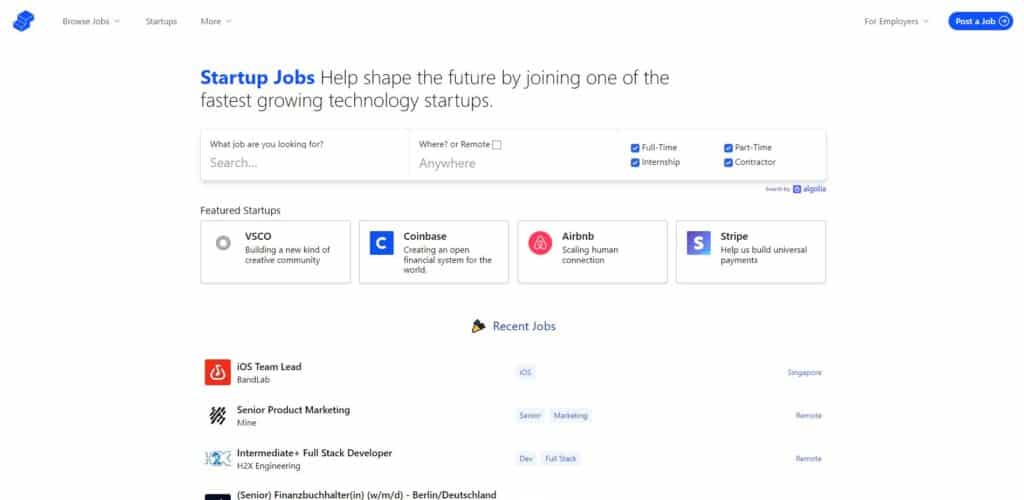With technology taking over the modern world, business is booming.
The myriad of startups that have stormed onto the scene is not only raising the standard of business but inspiring a new generation of entrepreneurs.
Startup companies are a big deal because they help drive the economy.
But what exactly is a startup?
What are the different types of startups, how do startups work, and what are the best examples of startups that do business right?
What Are Startup Companies?
A startup company is a small/ young business founded by one or several entrepreneurs.
This company works to develop a sustainable business model by combining existing resources, skills, and innovative approaches.
A startup’s working and business model differs from other companies, which often focus on making money.
Startups usually aim to solve a problem in the best possible way.
In most cases, they aim to create new products or services consumers need.
These startups can achieve their goals by building their product features or creating new markets.
How Do Startups Work?
In general, startups work like any other regular companies.
For instance, they can incorporate the best business checking accounts for LLCs or look for the best business credit cards for startups to ensure smooth operation, just as any other business would.
Ordinary/customary businesses duplicate what already exists, whereas startups try to create something new and innovative.
For example, Uber and Lyft are two trendy startups that aim to solve the inconvenience of hailing taxis.
These two companies introduced a modern way of calling for a cab and made it easy by operating through a mobile application and GPS tracking.
Startup companies invest heavily in research and development to ensure they succeed in creating something new.
The process usually involves a lot of hard work and huge risks.
What Is an Example of a Startup Company?
Many examples of startup companies have become incredibly popular and successful. Here are a few:
- Instagram: In 2010, Kevin Systrom and Mike Krieger created Instagram. This startup is one of the most successful examples of all time. Instagram is an app that allows users to share and view pictures. The photo-sharing app became extremely popular among the public, especially teenagers.
- Airbnb: Joe Gebbia, Nathan Blecharczyk, and Brian Chesky created Airbnb in 2008. This company allows people to rent out their properties to other people at a price as an alternative to hotels.
- Mailchimp: Mailchimp originated in 2001 and is currently one of the world’s most popular email marketing services.
- Uber: Travis Kalanick and Garrett Camp, two famous entrepreneurs, had an idea to create a reliable, convenient, affordable ride-hailing service for consumers. This later became what we know today as Uber.
- DoorDash: Co-founded by Stanley Tang, Andy Fang, and Tony Xu in 2013, DoorDash is a food delivery service based on a mobile application. The app allows users to order food from restaurants and schedule deliveries.
- Pandora: Per Enevoldsen created Pandora in Copenhagen. It manufactures Danish jewelry and is one of the most famous jewelry brands today.
- Netflix: Netflix is an entertainment streaming service Reed Hastings and Marc Randolph founded in 1997. Both successful businessmen started the company with attractive terms of guaranteed shares. This is also one of the world’s most excellent examples of what a startup can achieve.
- SpaceX: SpaceX is the world’s most remarkable example you will come across in many of the best business blogs. As a space exploration startup, this company specializes in creating rockets and vehicles for space projects.
- Shopify: In 2004, Tobias Lütke founded Shopify, a platform that offers online retailing. It is a trendy and successful e-commerce website that both beginners and seasoned entrepreneurs currently use.
Why Do Startups Fail?
The risk involved in starting a startup can be challenging to swallow for many people, especially when it may be a risky venture.
As a new startup business, you should prepare for challenges and obstacles.
Here are some of the most common failures of startups.
1. Running Out of Money
Most startups fail because of the need for more investment capital and resources.
This can be attributed to a lack of financial competence or poor management.
Startups need continued funding to keep up with the competition in their sector.
This means that startups have to work day and night to ensure they are financially stable enough to sustain their business.
2. Partnerships That Sour
There is a danger of going into business with the wrong partner.
In the beginning, your startup company can be like a baby, and the person who provides that initial support will become your parent.
Unfortunately, some of these people have hidden motives.
If partners do not stand up for each other, trust deteriorates.
After this happens, a relationship sours, and the partnership dissolves.
This can leave a startup in financial ruin.
3. Bad Marketing Strategy
Bad marketing is the biggest rip-off of startups.
The startup business needs proper marketing to grow, but the problem is that most startups don’t invest sufficiently in their marketing.
As such, public awareness is low, and the company makes losses.
To avoid this problem, startups should ensure their products receive public recognition effectively.
They should check out the top network marketing companies too.
A good marketing strategy will go a long way in helping your startup grow.
4. Lack of Expertise
A business that starts with the proper background can succeed, and vice-versa is true.
Startups are not easy to start because they require relatively uncommon knowledge.
These businesses create more jobs and help people succeed in their careers.
Therefore, hiring experts and ensuring the startup is run well is best.
The presence of actual experts will go a long way in helping you eliminate risks and stay ahead of the game.
5. Competition Does Better
In most cases, startups fail due to competition.
This industry has great competition, with numerous companies competing for the same market share.
This can lead to a situation where the startup does not receive the attention it needs to grow.
Continuing to run a business in this position may not be sustainable, which leads to failure.
How To Find Startup Companies Hiring
There is a wide variety of hiring companies posting as they are looking to hire startup experts.
Here’s how you can go about looking for your dream job.
1. AngelList

AngelList is a website that incorporates angel investors, startups, and job seekers aspiring to portray their skills by working at startups.
The website began in 2010 as an online introduction board for startups in the technology sector in need of seed funding.
It has since grown and allows startup businesses to gather funds from angel investors at zero cost.
2. Startup Jobs

Startup Jobs is another job portal for startups that started in 2012.
Startup Jobs is a platform that seeks to connect talented people with startups looking to hire them.
As such, it makes it easier for startups to hire talented, experienced, and passionate individuals.
3. Cold Pitch Startups You Hear About
Apart from visiting online platforms to find a startup to work for, individuals can also cold pitch any startups they hear about.
Cold pitching refers to delivering targeted emails to a potential employer to get in touch with them and tell them why you are the best person for their needs.
This way, you connect with the top startup companies and make them aware of your skills and experience.
How To Start a Startup
If you are considering venturing into the startup world, there are various steps you need to follow to ensure your success.
Here’s how you can go about starting your own startup business.
1. Start With an Idea
The first step is to develop a business idea that is viable and attractive to both customers and investors.
If you are already working in an established business, you already have a good idea of your industry.
This is why you need to develop a new idea that stands out and will be relevant to customers’ present needs.
You can listen to some of the best podcasts about business for start-up inspiration.
2. Conduct Market Analysis
Once you have a good idea and a plan to go with it, it is time to conduct a market analysis.
This involves assessing the needs of your customers and the fastest way to meet these needs.
3. Make a Business Plan
Once you have a good idea and a plan for delivering the same, it is time to make your business plan.
An effective business plan will give you the necessary information to carry out your work.
It will also give you the guidelines for achieving your target.
Suggested Reading: How to create a business plan for a blog
4. Find a Backer
The next step is to find a backer.
This is an individual who will provide funding for your startup business.
You must approach the individual with a specific plan and ensure the person supports your idea and goals.
5. Follow All the Legal Steps
All startups need to meet specific legal requirements before registering as legitimate businesses.
For instance, you must secure a business license, register your business with the appropriate authorities, and pay the required registration fees.
Make sure you adhere to all these legal requirements to be in good standing.
It is also worth copyrighting a business name so that a competitor does not take it.
6. Hire the Right People
Like anything starts with an idea, you must get the right people on board.
This is because, with the right people, you can have a team with the skills and experience to execute your business plan effectively.
Start with a team of people you trust and can easily mentor with daily business and motivational quotes.
This will make it easier as you can explain the details of your plan and ensure that everyone understands the objectives of your business.
7. Set Up Your Business
After you have all the people you need, it is time to set up your business.
This involves buying office tools and furniture and making other arrangements to enable your business to run effectively.
8. Come Up With a Marketing Plan
After setting up your business and getting people on board, it is time for you to create a marketing plan to help you market your product or service.
This will ensure that your business gets the exposure it needs and that customers know your company’s purpose and values.
How Do I Start a Startup With No Money?
Did you know that you can start a startup with no money?
This is indeed possible. Here’s how you can be able to achieve this.
1. Crowdfund
This refers to the practice of getting a group of people through the internet to help you fund your startup company.
You can use this method to raise the required funds for your startup.
You can also use crowdfunding to judge the interest and support for your idea.
2. Find Investors
If you cannot raise funds through crowdfunding, you can find investors who will fund your startup company.
However, you need due diligence to ensure that you pick investors who understand your startup and can provide funds.
3. Partner With Someone Who Has the Money
If you cannot raise the required funds through crowdfunding and investing, you can partner with someone with the money.
Afterward, you can share some of the profits you will make in the future.
4. Try a Small Business Loan
Another option you have is to go for a small business loan.
You can find lenders who will provide you with a short-term loan to help fund your startup business.
You can also open a business credit card for startups to give you working capital while you get revenue coming in.
Frequently Asked Questions
Here are some of the most frequently asked questions by people keen on starting their startups.
What are the two types of startup companies?
Small business startups and scalable startups are the two types of startup companies.
Small business startups refer to those started and self-funded by regular people, while scalable startups refer to those commercial startups in the tech niche, for example, Google.
Which startups are the most profitable?
Tech startups are the most profitable, according to many experts.
This is because tech startups enjoy better economies of scale and are more likely to get acquired by the big players if they perform well.
Wrapping Up
Startup companies are excellent ways to start your own small business and perhaps change the world.
You can have a startup by yourself, your friends, and your colleagues.
The key is having a good plan you and your team can follow.
With the proper focus, you can create a successful startup company.
Contact us today to get more information on how to begin your startup or let us know if you have any questions in the comments below!






